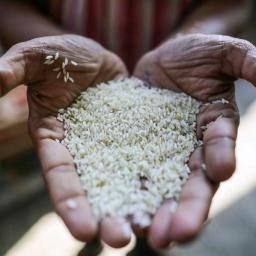A new type of GM rice fights climate change, increases yields
 After three years of field trials in China, a group of international scientists led by Chuanxin Sun at Swedish University of Agricultural Sciences, in collaboration with Chinese and American scientists, have developed a new type of genetically modified rice that could boost food sustainability while fighting climate change..
After three years of field trials in China, a group of international scientists led by Chuanxin Sun at Swedish University of Agricultural Sciences, in collaboration with Chinese and American scientists, have developed a new type of genetically modified rice that could boost food sustainability while fighting climate change.. Rice paddies are one of the largest sources of atmospheric methane, which is thought to be responsible for one-fifth of the global warming effect. The new genetically-modified strain of Nipponbare rice - equipped with a gene taken from barley - emits as little as 1% of the methane. What's more, the new rice produces significantly higher yield per plant. The reason: More carbon going into rice grains left less carbon to go elsewhere - which ultimately feed microbes that produce methane. Scientists have been working to develop rice with higher-nutrition, low-emissions traits for years, given that the crop that plays such a significant role in the diets of some 3 billion people.
While some experts hail the findings as an important breakthrough, it seems likely to add new fuel to the heated debate over genetically modified (GM) foods. "Right now, Chinese society is very sensitive" to concerns about GM food, Sun said. China, the world's largest producer of rice, hasn't allowed a single genetically modified rice variety into its fields. Assuming all further research goes well, the rice still might not be available for quite a while, given the regulatory processes involved.